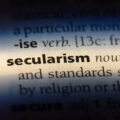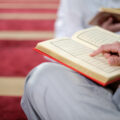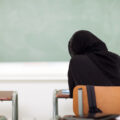A secular teaching of religious facts
A secular teaching of religious facts
Since schools in France are secular, there are no specific courses on religion. However, this does not mean that religion is absent from the curriculum.
This article is part of our series on the role of religion in education across Europe.
In France, as President François Hollande stressed in 2015, religion has no place in schools, but this does not preclude discussing it through secular teaching of religious facts.[1] Indeed, unlike most European countries, schools in France are secular, and this has been the case since the first secularisation laws of 1882 which pushed religious education outside the walls of the ‘School of the Republic’. Consequently, there are no specific courses on religion,[2] except in private religious schools – under an association contract with the State[3] or outside a contract. However, this does not mean that religion is absent from the curriculum.[4]
Teaching religions from the perspective of faith is an exception in France
The exceptional status of the Alsace-Moselle region[5] testifies to a former Republican way to reject theocracy and monitor religious authorities. Up until today, schools located in East France have been under a special status. Before addressing the situation at the national level, it is interesting to briefly outline this exception, its historical roots, and recent evolution.
In 1801, Napoleon Bonaparte established a treaty with Pope Pie VII to re-affirm Catholicism as one of the main faiths in France, and subject it to the laws of the Republic. This Concordat was abolished in 1905, when the State decided to withdraw from any religious concerns. Since Alsace-Moselle was German territory at the time, it was not affected by this separation between churches and the State. Up until today, the Concordat remains effective in East France. Under that status, four denominations are seen as traditional and supervised by the State: Catholicism, Reformed Protestantism, Lutheran Protestantism, and Judaism. The clerks of these denominations are paid as civil servants, and denominational education in schools is compulsory. However, parents can refuse to enrol their children in those denominational courses. This education is gradually tending to become a religious culture course rather than a catechism one.[6]
Acting against growing religious inculturation
In the rest of France, as early as the 1990s, the problem arose of how to deal with the lack of religious culture among a growing number of students who, for this reason, found it difficult to understand symbolic references, artistic works, or historical events.[7] In 2002, the Debray Report, entitled ‘On the teaching of religious facts in secular schools’, addressed to the Minister of National Education, echoed this issue and proposed several measures that promote the secular teaching of religious facts. This teaching has subsequently been gradually introduced by the Ministry.[8]
The school does not transmit faith, it transmits knowledge
This teaching favours an objective approach to religion, based on a claimed distinction between the sphere of beliefs (which should not be taught in school) and the sphere of knowledge. Therefore, religion is taught instead as historical, social, and cultural facts through transdisciplinary teaching: history, literature, history of the arts, music education, art class, and philosophy.[9] In other words, the teaching of religious facts (e.g. rites, founding texts, customs, symbols, social events, and artworks) aims to present the diversity of representations of the world to better understand societies of the past and the cultural heritage of today. It is therefore a cultural and intellectual issue.[10]
Teaching religions and laïcité: a political challenge
From 2015 onwards, due to the Islamist terrorist attacks and the trauma they cause throughout society, the teaching of religious facts in schools, combined with moral and civic education, became a political issue.[11] Laïcité is a legal-political principle that regulates and protects cultural and religious diversity. This fundamental principle of the French Republic is in fact based on fundamental freedoms and a common rule that allows the differences of each person to be transcended and nourishes the republican ideal of the French nation: plural but one.[12] A vision of the nation that is hardly compatible with a multiculturalist vision and rejects all separatism.[13] The teaching of religion in a secular framework is designed to contribute to training in citizenship, living in harmony with one another, respecting the freedom of expression of religious and cultural identities, and promoting dialogue in a spirit of respect and responsibility. On the 16th October 2020, the assassination of Samuel Paty, a history and geography teacher who showed his pupils a caricature of the Prophet Mohammed during a civic and moral education course, tragically reminded the population of the urgency of this issue.[14]
In the face of teacher reluctance and training challenges
Despite this, the teaching of religion, unlike moral and civic education, is the subject of much reluctance on the part of teachers or political representatives, which affects its quality. This situation can be explained by anti-religious reflexes, the fear of talking about sensitive subjects, or the feeling of not being sufficiently equipped to deal with religions in schools.[15] In fact, almost two-thirds of teachers feel that they are insufficiently trained to teach religious or secular facts in schools, and more and more French feel that religious facts should be taught more often in schools.[16]
Teacher training is now seen as a priority by public authorities,[17] but the challenge is considerable. However, private initiatives can sometimes help. For example, this is the case of the association Enquête[18] which, since 2010, has been designing and disseminating pedagogies and playful tools for teachers to educate about laïcité and religious facts, in order to develop a more peaceful and thoughtful relationship with children on these subjects.
Laurent Tessier and Clémence Sauty
Our team of analysts conducts research on topics relating to religion and society. In April, May and June 2021, we are focusing on the subject of education. Find out more on the EARS Dashboard.
[1] For a global and historical understanding of the subject, read « L’école publique et la religion : vers la fin du contentieux ? » (Public school and religion: towards the end of the litigation?) in Portier, Philippe et Willaime, Jean-Paul. La religion dans la France contemporaine. Entre sécularisation et recomposition (Religion in contemporary France. Between secularisation and recomposition). Paris : Armand Colin, 2021.
[2] Le retour du religieux en France : Regards croisés de Philippe Portier et Jean-Paul Willaime | École Pratique des Hautes Études
[3] A private school under a contract of association with the state, often denominational, is an establishment that provides education in accordance with the rules and programmes of the National Education system. It is therefore not confessional education. All pupils, regardless of their religious beliefs (or not), must be admitted if they wish to do so. In return for this contract, these schools receive grants to cover operating costs, including teacher salaries. Ecole et religion en France (EUREL)
[4] The teaching of religion in schools is included in the education programmes of the National Education system, and as such, it concerns state-contracted denominational and as well as public schools. Moreover, issues related to laïcité in public schools (prohibition of the wearing of ‘ostentatious’ religious signs by pupils, the neutrality of teachers, meals in the canteen) or public funding of state-contracted denominational schools must be dealt with separately from the issue of teaching religious facts in school.
[5] A region in the east of France which includes the departments of Haut-Rhin, Bas-Rhin and Moselle.
[6] Les exceptions au droit des cultes issu de la loi de 1905
[7] Laïcité et faits religieux – Enseignement Catholique
[8] Texte du Rapport Debray, “L’enseignement du fait religieux dans l’école laïque”
[9] L’enseignement du fait religieux à l’école, le rapport Debray
[10] A few examples are given by Isabelle Saint-Martin (IESR-EPHE), a specialist in the teaching of religion in France: Enseignement laïque des faits religieux – Les valeurs de la République, Canopé.
[11] Histoire de l’enseignement moral et civique de 2012 à aujourd’hui
[12] Jean Baubérot – La laïcité française : républicaine, indivisible, démocratique et sociale
[13] Modèle français ou américain : les conceptions de la laïcité en Europe
[14] Long format. Après l’attentat contre Samuel Paty, comment s’enseigne la laïcité à l’école
[15] André Blandin, André Legrand, Philippe Le Guillou, Mark Sherringham et Jean-Paul Willaime, « Le religieux et l’école en France », Revue internationale d’éducation de Sèvres, 36 | 2004, 49-70.
[16] Six Français sur dix jugent que la laïcité n’est pas assez enseignée à l’école
[17] Laïcité : « La priorité est de former les enseignants »






